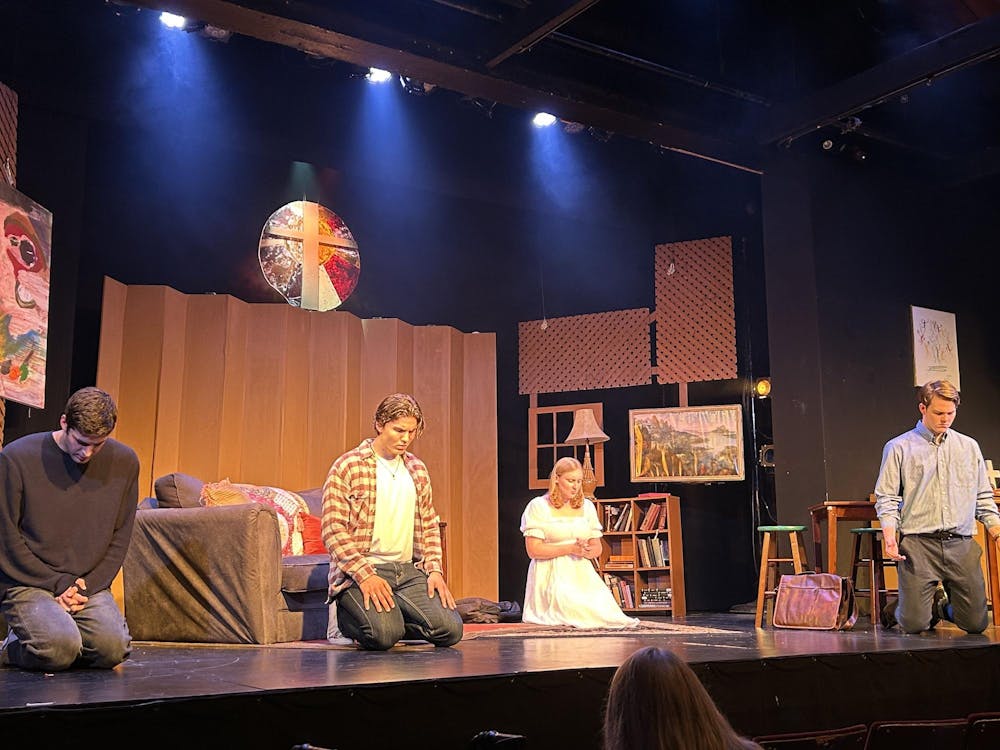Watch empathetically and with an open heart.
This was the general message of the opening remarks on the opening night of Theatre Intime’s first show of the semester “The Harvest” — originally written by Samuel D. Hunter and now directed by Christie Davis ’27. This introduction set the mood for what would be a very somber, multifaceted storyline about religion’s role in people’s lives.
The play follows a troubled young man named Josh, portrayed by Xander Constantine ’27, who decides to pursue a mission trip in the Middle East indefinitely, as his estranged sister Michaela, played by Kailani Melvin ’28, struggles to convince him otherwise.
Though the main storyline revolved around this familial conflict, tangential allegories were incorporated throughout all the scenes — centering on secondary characters like the nervous-natured Tom, portrayed by Vincent Gerardi ’25, married couple Marcus and Denise, played by Joe McLean ’27 and Leah Johnson ’27, respectively, and overly-enthusiastic church leader Ada, depicted by Chloe Webster ’25. All of these stories, interwoven with one another, take root in the theme of religion.
Religious fervor and budding sentiments of skepticism unexpectedly complemented each other in a way that packaged both devotion and doubt as significant forces in one’s life trajectory. The intense body language of the actors, as well as natural voice inflections and dramatic changes in tone to reflect ever-changing, complex emotions, were indications of the characters becoming self-aware of their true feelings and pious beliefs.
Witty, light-hearted moments of dry humor were presented throughout the play, tastefully easing the tension that accompanied the tumultuous journey of self-discovery experienced by its characters. This was a surprisingly fresh element of the show, just like the characters’ speaking in tongues — the practice of speaking a “holy” language that no one is familiar with — adding an intriguing linguistic nuance to the play’s dominant religious theme.
Additionally, intimate ponderings during monologues coincided well with the lighting cues and scene transitions, underlining the emotive significance and environment of individual conversations. Silence commanded certain scenes to highlight an entering character’s mere presence on stage, while other times the spotlights smoothly shifted in color and scope to speak to the characters’ ever-oscillating sentiments of certainty and ambiguity. Even minor details like a character taking the time to actually cook instant noodles during one scene, or another being visibly drenched in a different scene to simulate having been out during a rainstorm, illustrated the meticulous attention and dedication paid to production.
After proposing the idea for this show this past spring, Davis explained that “a lot of research [was] involved on themes related to pentecostalism — a specific brand of evangelism.” This included understanding how mission trips function in churches and shape the cultural fabric of religion, both domestically and abroad. From this preparation, the significance of faith on an individual scale, as well as on a community level, was comprehensively articulated, presenting a well-rounded interpretation of religion.
Davis is a contributing Opinion writer & contributing Archivist for the ‘Prince’.
Translating these elements to the stage encompassed more than the coordination of technical aspects like set design and lighting. It also required a critical analysis of the original script, utilizing literary perspectives that would challenge prevailing understandings of the text and reorient them in a way that would emphasize the intricacies of religious ideology.
“It’s really been a great opportunity for intellectual and artistic exchanges amongst everyone,” said Davis when reflecting on the artistic processes of production that ultimately guided her in realizing her vision for the play.
Attesting to Davis’s artistic prose, Elena Milliken ’26, Production Manager of Theatre Intime, recalled how she and the rest of the Intime board were impressed by Davis’s approach to engaging with the play’s story.

“It’s an impressive feat for a director to try to take on something that both holds so much significance but is also really deeply personal and intimate,” described Milliken.
Davis drew on her personal background of exposure to fundamentalist American evangelism at a young age to inform her aim of the play: providing a non-judgemental insight into religious communities. By examining the complex motivations of why people participate in church, Davis hopes to mitigate the stigmatized attitudes towards zealous religious cultures on campus.
Milliken describes how addressing complicated ideas of missionary work and curiosities about the role that God could play in someone’s life is integral to a more empathetic, yet constructive discourse on a community level. She elaborates on this by saying that respectful, critical dialogue contributes to “that nuance and balance … that we constantly need on this campus, and something that ‘The Harvest’ does exceptionally well.”
Russell Fan is an associate editor for The Prospect at the ‘Prince.’ He can be reached at rf4125@princeton.edu, or on Instagram @russell__fan.








